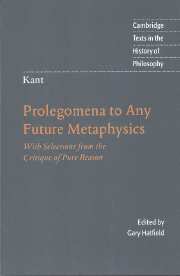Book contents
- Frontmatter
- Contents
- Acknowledgments
- Introduction
- Chronology
- Further reading
- Note on texts and translation
- Prolegomena to Any Future Metaphysics
- Selections from the Critique of Pure Reason
- Table of Contents for the Critique
- From the Preface to the Second Edition
- From the Introduction
- From the Transcendental Aesthetic
- From the Transcendental Logic, Introduction
- From the Transcendental Logic, First Division, Analytic
- From the Transcendental Logic, Second Division, Dialectic
- From the Transcendental Doctrine of Method
- Index
- Cambridge texts in the history of philosophy
From the Transcendental Logic, Introduction
Published online by Cambridge University Press: 05 June 2012
- Frontmatter
- Contents
- Acknowledgments
- Introduction
- Chronology
- Further reading
- Note on texts and translation
- Prolegomena to Any Future Metaphysics
- Selections from the Critique of Pure Reason
- Table of Contents for the Critique
- From the Preface to the Second Edition
- From the Introduction
- From the Transcendental Aesthetic
- From the Transcendental Logic, Introduction
- From the Transcendental Logic, First Division, Analytic
- From the Transcendental Logic, Second Division, Dialectic
- From the Transcendental Doctrine of Method
- Index
- Cambridge texts in the history of philosophy
Summary
Introduction: The idea of a transcendental logic
Our cognition arises from two fundamental sources in the mind, the first of which is the receiving of representations (receptivity of impressions), the second, the capacity to cognize an object by means of these representations (spontaneity of concepts); through the first an object is given to us, through the second this object is, in relation to this representation (as a mere determination of the mind), thought. Intuition and concepts therefore constitute the elements of all our cognition, in such a way that neither concepts without intuition in some way corresponding to them, nor intuition without concepts, can yield a cognition. Both are either pure or empirical. Empirical, if sensation (which presupposes the actual presence of the object) is contained in it; but pure if no sensation is intermixed with the representation. The sensation can be called the matter of sensory cognition. Hence, pure intuition contains only the form under which something is intuited, and a pure concept contains only the form of the thought of an object in general. Only pure intuitions or concepts alone are possible a priori; empirical intuitions or concepts are possible only a posteriori.
If the receptivity of our mind, its capacity for receiving representations insofar as it is affected in some way, is to be called sensibility; then, by comparison, the capacity for generating representations by itself, or the spontaneity of cognition, is the understanding.
- Type
- Chapter
- Information
- Kant: Prolegomena to Any Future MetaphysicsWith Selections from the Critique of Pure Reason, pp. 166 - 167Publisher: Cambridge University PressPrint publication year: 1997

